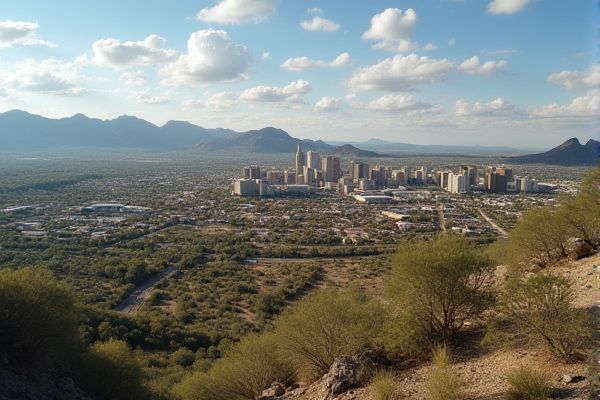
Internet and telecommunications options in Arizona: Major Providers: Cox, CenturyLink, and Sparklight. Available High-Speed Internet Types: DSL, Cable, Fiber. Rural Areas: Limited internet access. Satellite Options: HughesNet and Viasat for remote locations. 5G Coverage: Expanding in major cities. Cellular Service: AT&T, Verizon, T-Mobile dominate. Public Wi-Fi: Available in libraries, cafes, and parks. Average Speeds: Vary based on region and provider. Internet Prices: Starting around $30/month. Installation: Self-install kits often available.
Major Providers: Cox, CenturyLink, and Sparklight.
In Arizona, the major internet providers include Cox, which offers the fastest widespread internet with speeds up to 2,000Mbps; CenturyLink, the primary fiber internet provider with significant coverage in Phoenix, Tucson, Flagstaff, and Yuma; and Sparklight, although it is not as prominently mentioned, it is one of the several major providers available in the state, offering cable internet services. For more details on the internet options available across these cities, visit HighSpeedInternet.com to compare plans and providers.
Available High-Speed Internet Types: DSL, Cable, Fiber.
In Arizona, high-speed internet options are diverse and cater to a range of user needs. DSL services, offered by CenturyLink, provide speeds up to 940 Mbps, while cable services from providers such as Cox and Mediacom deliver speeds up to 1,000 Mbps. Additionally, fiber internet is available to about 17% of households, mostly in metropolitan areas like Phoenix and Tucson, with impressive speeds reaching up to 5,000 Mbps from providers including AT&T Fiber and Quantum Fiber. For more details, visit this comprehensive guide on Best Internet Providers in Arizona, detailing the full range of services and options available across the state.
Rural Areas: Limited internet access.
Rural areas in Arizona face significant challenges in accessing reliable internet, grappling with physical barriers, unreliable connections, insufficient bandwidth, and high costs, all of which hinder crucial activities such as remote work, telehealth, and online education. Addressing these issues, Phoenix Internet has emerged as a pivotal solution by employing pioneering fixed-point wireless technology, which provides high-speed internet to remote areas, overcoming geographical constraints and offering reliable connectivity for both residential and business users. In a significant boost, the Biden-Harris Administration has dedicated nearly $28.5 million in grants to enhance the connectivity of rural Arizona residents to high-speed internet. This initiative focuses primarily on areas lacking adequate speeds and ensures affordability through the Affordable Connectivity Program. For more insights on developing digital equity plans, visit Benton.
Satellite Options: HughesNet and Viasat for remote locations.
In Arizona, both HughesNet and Viasat offer reliable satellite internet services for remote locations. Viasat provides download speeds up to 100-150 Mbps in limited areas and at least 50 Mbps almost anywhere, while HughesNet offers speeds up to 25 Mbps and 100 Mbps with its Gen5 plans, both ensuring high-speed Internet access regardless of geographical constraints.
5G Coverage: Expanding in major cities.
Arizona's 5G coverage is robust in urban areas such as Phoenix, Tucson, and Mesa, with major carriers like AT&T, Verizon, T-Mobile, and U.S. Cellular actively expanding their 5G networks. They are particularly focused on cities and along interstates, while also improving service in rural and remote regions. To learn more about Arizona's cellular coverage and dead zones, visit Dead Cell Zones.
Cellular Service: AT&T, Verizon, T-Mobile dominate.
In Arizona, AT&T, Verizon, and T-Mobile dominate the cellular service landscape, each offering varying degrees of coverage across the state. Verizon stands out with a substantial 4G presence, leading with an impressive 71.27% coverage. Conversely, T-Mobile boasts the best 5G coverage, reaching 41.42% of Arizona, providing a strong future outlook for mobile users. Meanwhile, AT&T, while offering reliable network service with 56.81% 4G coverage, struggles with its 5G network, covering just 8.9% of the state. This dynamic competition highlights the evolving telecommunications landscape in Arizona, catering to the diverse connectivity needs of its residents.
Public Wi-Fi: Available in libraries, cafes, and parks.
In Phoenix, Arizona, public Wi-Fi is available at various locations including nearly 50 libraries, community, senior, and recreation centers, as well as in the parking lots and public areas outside these facilities from 8 a.m. to 9 p.m. daily. Additionally, free Wi-Fi can be found at public libraries, coffee shops, and some public parks, with network names varying by location, such as PHXCITYWIFI for most sites and specific network names for different library branches.
Average Speeds: Vary based on region and provider.
In Arizona, internet speeds vary significantly based on the region and provider, with average download speeds ranging from 20 Mbps to 940 Mbps. Fiber availability is limited, especially in rural areas, presenting unique challenges for residents seeking high-speed connections. However, major providers like Cox, CenturyLink, and Xfinity offer varying speeds across different regions. For detailed insights on the choices available, visit the Best Internet Providers in Arizona guide, which highlights the performance and coverage of these providers across the state.
Internet Prices: Starting around $30/month.
In Arizona, internet prices can start as low as $24.99/month with Mediacom's cable plans offering 100-1,000 Mbps. Other affordable options include T-Mobile's 5G home internet starting at $40/month, and Cox's plans beginning at $30/month for cable and fiber connections. For more detailed information, you can explore local options on AllConnect, which provides an extensive overview of available internet services in the area.
Installation: Self-install kits often available.
Self-installation kits are often available for internet providers in Arizona, such as CenturyLink, where DSL customers can use a self-install kit for a $25 fee, while fiber internet customers typically require a free professional installation. The kits include necessary equipment like modems, power cords, and Ethernet cables, and the process usually takes about 30 minutes to complete. To learn more about the installation process, you can visit the CenturyLink Installation guide.
